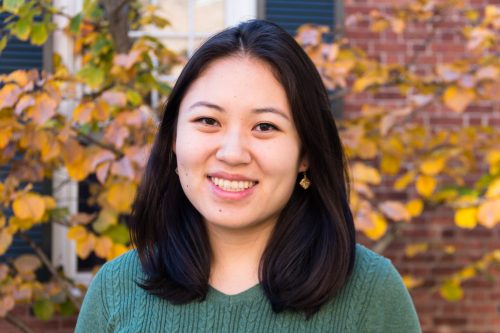“What motivates me most about doing research in biomedical engineering is seeing the future impact of your work,” said Ellen Kan (YC ‘19). “It’s an incredible feeling to think that your research could have the potential to affect millions of people’s lives.”
Kan has spent the last two summers working with Professor Laura Niklason and Ph.D. student Alex Engler. She initially learned about Niklason’s research as a first-year, when she wrote a Yale Daily News article about Niklason’s election to the National Academy of Medicine. Hearing Niklason describe how her lab transformed the idea of bioengineered blood vessels into a tangible product currently being tested in clinical trials sparked Kan’s interest in translational research and the field of tissue engineering. The next year, after Alex was her teaching fellow in a physiology class, Kan realized she wanted to apply the concepts she learned about the respiratory system to a real-world problem. When she joined the Niklason Lab, Alex became a critical mentor who fostered her passion for biomedical engineering research.
In the Niklason lab, Kan quickly relished in the ability to engage in hands-on projects and move toward addressing real-life medical challenges like lung disease, which is currently the third leading cause of death in the United States. The ultimate goal of the Niklason team’s lung engineering research is to provide patients suffering from end-stage lung disease with a reliable set of bioengineered lungs tailored to their bodies.
Kan’s research focuses on the oxygen-sensitive alveolar epithelial cells that help form the blood-air barrier of the lungs. If there is too little oxygen in the environment, cells will die; however, if there is too much oxygen, these cells undergo dedifferentiation, a process in which they lose their adhesive properties and gain migratory properties. Both cell death and dedifferentiation lead to a loss of barrier function, which ultimately results in fluid accumulation and lung failure. “My goal is to create a system that can directly look at how oxygen tension can impact the lung epithelial cells’ performance and discover the ideal conditions for promoting full barrier function,” said Kan.
To track the growth and performance of these cells, Kan designed a tunable bioreactor system that allows for the precise quantification of oxygen consumption rates of lung tissue. She first worked with Alex to create a mathematical model that looks at how various parameters, such as tubing dimensions, could affect oxygen content in the system. Kan is currently conducting a series of native rat lung cultures that will provide experimental validation that the mathematical model can accurately convert dissolved oxygen measurements into tissue oxygen consumption rates.
The final part of the study, which Kan will complete next semester for her senior thesis, is to apply this optimized system to culturing tissue-engineered lungs. Ultimately, she hopes that this system will allow oxygen levels to be adjusted non-invasively to improve cell survival and differentiation — and ultimately, barrier function — in engineered lungs.
“Living things are really complex, and it would be incredible if we could directly translate these real-time measurements to understanding how the cells are functioning, so that we can always know how the lung is doing over a several-day culture period,” Kan said. Yet, she realizes that working with an organ as complex as the lung can mean encountering trends and observations that are difficult to explain. She reminds herself that as a researcher, you have to be okay with delayed gratification. “When you are working at a very intricate level, you forget about the bigger picture from time to time, and I think it’s really important to return yourself back to the end goal,” said Kan.
After graduation, Kan plans to continue exploring translational research in graduate school. She would eventually like to pursue a career in academia, where she hopes to make an impact by building inclusive, supportive communities in both the classroom and research lab, especially for underrepresented minorities in STEM.
Kan’s advice for aspiring researchers is simple yet powerful: “You must have the stamina, resilience, and stomach to power through failure, which is a vital intermediate step before you can achieve success.” Kan can appreciate how the many hurdles she has overcome have pushed her to become a more thoughtful researcher, driven to uncover an elusive truth that might just reveal itself the next time around.

